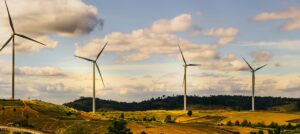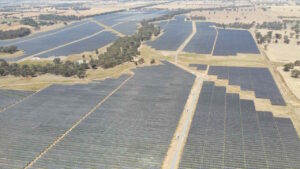French oil and gas supermajor Total will partner with Australian banking giant Macquarie’s Green Investment Group in a 50/50 partnership to develop a portfolio of five large floating offshore wind projects in South Korea with a combined capacity of more than 2GW, the largest in the word.
Total and Macquarie’s GIG announced on Tuesday they had signed a series of agreements to co-develop an initial portfolio of 2.3GW worth of floating offshore wind projects in South Korea. An initial five projects will be developed – three off the coast of the city of Ulsan with a combined capacity of 1.5GW, and two off the coast of South Jeolla Province totalling 800MW.
Already, the projects have begun on-site wind data collection and the first 500MW phase of the Ulsan project is expected to begin construction by the end of 2023.
The newly announced portfolio of floating offshore wind will play a significant role in South Korea’s own ‘Green New Deal’, which was announced by South Korean President Moon Jae-in in July ahead of this year’s general elections. South Korea is targeting 20% renewables by 2030 and a longer-term goal of between 30-35% by 2040.
South Korea is expected to invest over $US46 billion ($A62 billion) in renewable energy by 2030, according to recent analysis from analysts Wood Mackenzie.
“South Korea has lagged behind other countries in renewable deployments to date but declining costs and the ‘New Green Deal’ initiative will help the country to catch up in the next decade,” said Wood Mackenzie research director Alex Whitworth late last month.
“Over US$46 billion will be invested in South Korea’s renewables sector by 2030, quadrupling the share of wind and solar in generation to 13%. Another 6% will be sourced from biomass and other renewables taking South Korea to 19%, just shy of its 20% target.”
Total and Macquarie’s GIG announcement, then, serves a vital role in meeting these targets and fulfilling the country’s plans of ramping up its renewable energy capacity.
Moreover, according to Total, South Korea “has a significant potential for the development of a floating offshore wind segment benefiting from a strong governmental support and a unique set of local competencies amongst which the extensive shipbuilding know-how and the country’s ambitious R&D programs.”
“Our entry in the floating offshore wind segment in South Korea is in line with Total’s strategy to profitably develop renewable energy worldwide and contribute to our net zero ambition,” said Patrick Pouyanné, Chairman & CEO of Total.
“We strongly believe in the potential of floating offshore wind in South Korea, which will play a key role in achieving the country’s renewables objectives. Thanks to its extensive experience in offshore projects, in cooperation with many Korean shipyards, Total is particularly well positioned to contribute to the successful development of this new technology in South Korea together with our partner GIG.”
An important aspect of the two companies’ floating offshore wind portfolio is a focus on maximising the involvement of South Korean supply chains – which will further support the country’s Green New Deal as it targets the creation of 1.9 million new jobs through green energy and other technologies.
Macquarie’s GIG has signed a Memorandum of Understanding with Ulsan City and 18 organizations including local manufacturers HESI and Unison, Korea East-West Power, KEPCO-ENC, and a number of R&D organizations including Ulsan Techno Park and Ulsan University.
“We are indeed very keen to expand our long-term cooperation with South Korea, contribute to the diversification of its energy mix and support the emergence of a new industrial sector by maximizing Korean content within the supply chain of these projects,” said Total’s Pouyanné.
“Thanks in large part to the country’s world-class shipbuilding and marine plant infrastructure, GIG and Total see significant opportunities for floating offshore wind in Korea,” said Mark Dooley, Global Head of GIG.
“We are committed to working with Korean companies and the local workforce as much as possible in order to support the Korean government’s Green New Deal plan, revitalize the economy and support jobs through Korea’s green transition.”
South Korea’s plans for ramping up its renewable energy include a plan for delivering 12GW of offshore wind capacity by 2030, utilising the country’s unique size and geographic situation and driven by a need to move away from nuclear and coal imports.
“South Korea benefits from a unique set of competencies and assets to become one of the leading players in the floating offshore wind sector,” said Julien Pouget, Senior Vice-President Renewables at Total. “Total and GIG’s combined expertise and resources will contribute to the success of this strategy and help curb down the country’s carbon emissions, in line with our net zero ambition.”










